
Classes | |
| struct | pln_point |
| struct | pln_line |
| struct | pln_compl |
| struct | pln_circle |
| struct | pln_fquad_2var |
| struct | pln_fquad |
| struct | pln_circ |
| struct | pln_pos_state |
| struct | pln_time_state |
| struct | pln_aangle_state |
| struct | pln_angle_state |
| struct | pln_angle_eval |
Defines | |
| #define | DEBUG 1 |
| D=S2 F C=R3 +-------------+-------------+ | | | | | +H | | | | | R1+ +L=S1 =K| | | +r | | +G | | | | | +-------------+-------------+ A=S3 E B=R2. | |
| #define | FWIDTH 3.0 |
| Program parameters. | |
| #define | FHEIGHT 2.1 |
| #define | SET_POINT_A(p) SET_POINT((p), 0.0, 0.0) |
| #define | SET_POINT_B(p) SET_POINT((p), FWIDTH, 0.0) |
| #define | SET_POINT_C(p) SET_POINT((p), FWIDTH, FHEIGHT) |
| #define | SET_POINT_D(p) SET_POINT((p), 0.0, FHEIGHT) |
| #define | SET_POINT_E(p) SET_POINT((p), FWIDTH/2, 0) |
| #define | SET_POINT_F(p) SET_POINT((p), FWIDTH/2, FHEIGHT) |
| #define | SET_POINT_G(p) SET_POINT((p), FWIDTH/2, FHEIGHT/4) |
| #define | SET_POINT_H(p) SET_POINT((p), FWIDTH/2, FHEIGHT/4*3) |
| #define | SET_POINT_K(p) SET_POINT((p), 0, FHEIGHT/2) |
| #define | SET_POINT_L(p) SET_POINT((p), FWIDTH, FHEIGHT/2) |
| #define | SET_POINT_R1(p) SET_POINT_K(p) |
| #define | SET_POINT_R2(p) SET_POINT_B(p) |
| #define | SET_POINT_R3(p) SET_POINT_C(p) |
| #define | TIME2ANGLE(p, t) (((double)t)/((double)p)*2*M_PI) |
| Other macros. | |
| #define | SET_POINT(p, a, b) ({(p).x=(a); (p).y=(b);}) |
Functions | |
| void | pln_get_position (struct pln_angle_state as, struct pln_pos_state *pos) |
| FUNCTION PROTOTYPES. | |
| void | pln_set_points () |
| Set values of points we already know for later use. | |
| void | pln_pos2ang (struct pln_pos_state ps, struct pln_aangle_state *aas) |
| Convert position to angles. | |
| void | pln_coordinate (struct pln_pos_state estpos, struct pln_aangle_state aas, struct pln_angle_state *as) |
| Angle coordinations. | |
| void | pln_sel_angles (struct pln_pos_state estpos, double *angles, int angcount, struct pln_aangle_state *maas) |
| Select angles most probable from all measured angles. | |
| void | pln_cal_position (unsigned int *times, unsigned int timecnt, struct pln_pos_state act_pos, struct pln_pos_state *est_pos) |
| Calculate position from measured times and from the actual position. | |
| int | cmpd (const void *a, const void *b) |
| Compare doubles. | |
| void | test_angles (struct pln_point *positions, int *poscount) |
| Test all possible positions. | |
| void | test_coordination () |
| Test pln_coordinate() function. | |
| void | test_sel_angles () |
| Generate random angles and test if the function pln_sel_angles() works correctly. | |
| void | test_cal_position (struct pln_point *positions, int *poscount) |
| Test this library. | |
Variables | |
| struct pln_point A B C D E F G H K L R1 R2 | R3 |
Define Documentation
| #define DEBUG 1 |
D=S2 F C=R3 +-------------+-------------+ | | | | | +H | | | | | R1+ +L=S1 =K| | | +r | | +G | | | | | +-------------+-------------+ A=S3 E B=R2.
Fixed points (known points) [x,y] A - [0,0] B - [width,0] C - [width,height] D - [0,height] E - [width/2,0] F - [width/2,height] G - [width/2,height/4] H - [width/2,height/4*3] K - [0,height/2] L - [width,height/2] Our reflectors R1, R2, R3 Opponent`s reflectors S1, S2, S3
Unknown point r - Position of the robot
Angles: theta1 = from robot`s head to the first reflector theta2 = from robot`s head to the second reflector theta3 = from robot`s head to the third reflector alfa = angle R3-r-R2 (S2-r-S3) beta = angle R1-r-R3 (S3-r-S1) gama = angle R1-r-R2 (S1-r-S2)
Angle`s sense - counterclockwise
Terminology:
- absolute angle - angle between head and reflector (theta1,theta2,..)
- relative angle - angle between reflectors (alfa, beta, ...)
| #define FHEIGHT 2.1 |
| #define FWIDTH 3.0 |
Program parameters.
Playground size and known points
Function Documentation
| int cmpd | ( | const void * | a, | |
| const void * | b | |||
| ) |
Compare doubles.
Used by qsort().

| void pln_cal_position | ( | unsigned int * | times, | |
| unsigned int | timecnt, | |||
| struct pln_pos_state | act_pos, | |||
| struct pln_pos_state * | est_pos | |||
| ) |
Calculate position from measured times and from the actual position.
- Parameters:
-
times measured times. The period is expected on the 1st position. timecnt number of measured times act_pos actual position est_pos calculated position
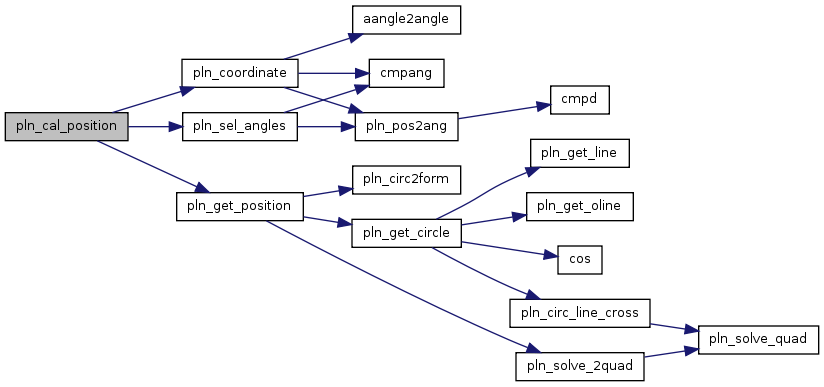

| void pln_coordinate | ( | struct pln_pos_state | estpos, | |
| struct pln_aangle_state | aas, | |||
| struct pln_angle_state * | as | |||
| ) |
Angle coordinations.
From the estimated position (x,y,head) and measured times determine correctly angles needed to count the position by measured angles.
- Parameters:
-
estpos estimated position aas measured angles (after selection) as angles between reflectors (correctly aligned)
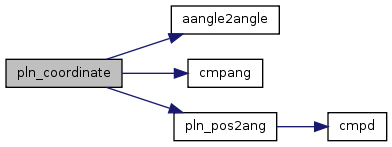

| void pln_get_position | ( | struct pln_angle_state | as, | |
| struct pln_pos_state * | pos | |||
| ) |
FUNCTION PROTOTYPES.
FUNCTION PROTOTYPES.
- Parameters:
-
as angles between reflectors pos enumerated position
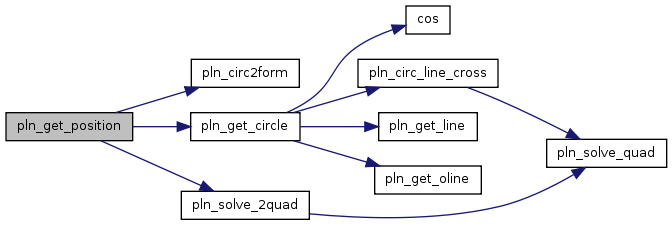

| void pln_pos2ang | ( | struct pln_pos_state | ps, | |
| struct pln_aangle_state * | aas | |||
| ) |
Convert position to angles.
- Parameters:
-
ps position to be converted aas 3 angles between head and reflectors


| void pln_sel_angles | ( | struct pln_pos_state | estpos, | |
| double * | angles, | |||
| int | angcount, | |||
| struct pln_aangle_state * | maas | |||
| ) |
Select angles most probable from all measured angles.
Use estimated position to evaluate them.
- Parameters:
-
estpos estimated position angles measured angles (times) angcount amount of measured angles maas selected angles


| void pln_set_points | ( | ) |
Set values of points we already know for later use.
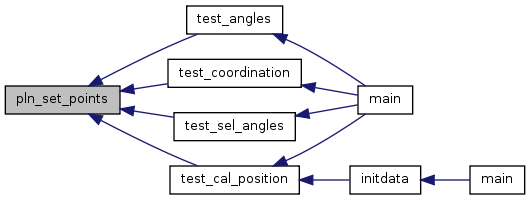
| void test_angles | ( | struct pln_point * | positions, | |
| int * | poscount | |||
| ) |
Test all possible positions.
Convert positions to angles and then do the reverse conversion.
- Parameters:
-
positions positions of wanted points poscount count of positions
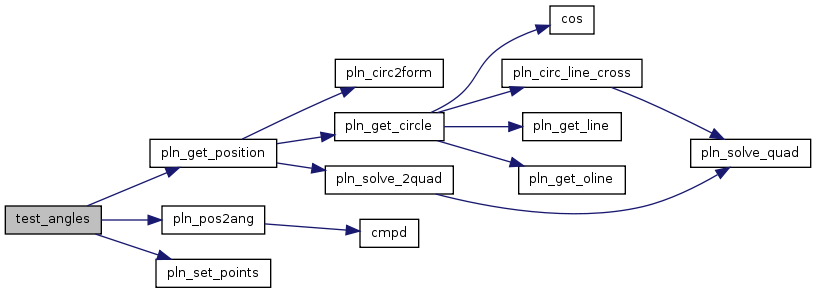

| void test_cal_position | ( | struct pln_point * | positions, | |
| int * | poscount | |||
| ) |
Test this library.
Set some actual position, give it measured times and hope that everything will works correctly.
- Parameters:
-
positions positions of wanted points poscount count of positions
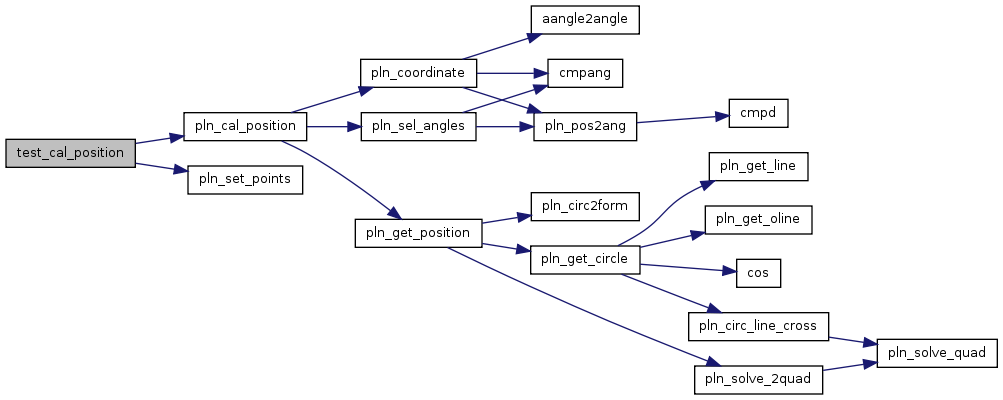

| void test_coordination | ( | ) |
Test pln_coordinate() function.
For any value of head`s angle it should return the same alfa, beta and gama.
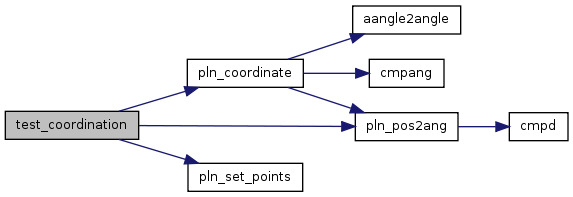

| void test_sel_angles | ( | ) |
Generate random angles and test if the function pln_sel_angles() works correctly.


 1.7.1
1.7.1